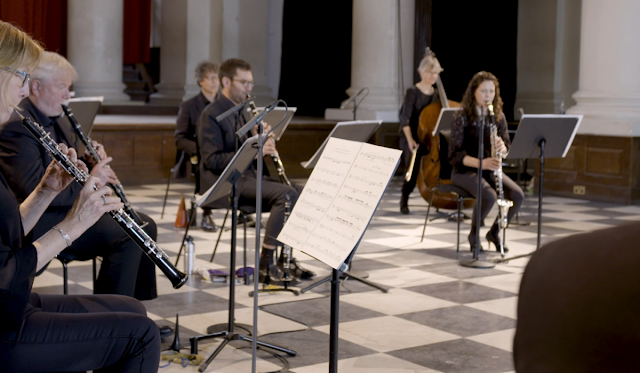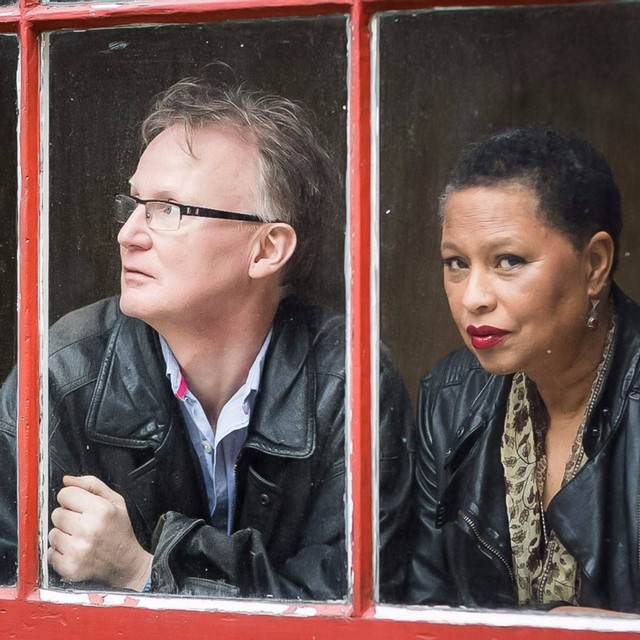 |
| Eleanor Alberga (Photo Benjamin Ealovega) |
Nightscape was a joint commission from the London Mozart Players and the Horniman Museum in 1993 and intended as a pair with Mozart's Gran Partita. Because she was writing a work to act as a companion to Mozart's serenade, Eleanor decided to write a serenade for the same line-up of instruments, but the night time that the work would evoke would be that of the Jamaican world Eleanor knew as a child. The movements include 'Sundown', which evokes the evening with cicadas, party goers, geckos, and other nocturnal creatures, 'Into the arms of Morpheus', evokeing sleep whilst the title of the third, 'Brer Fox and the Dancing Ghost' which refers to a lullaby about a fox that Eleanor's mother used to sing her.
After the work's premiere in 1993, Eleanor 'locked it in the attic' intending to come back and revise it. Then more recently the Academy of St Martin in the Fields contacted her about the piece. She decided that it did not need much revision after all, and has now come back to life, including being listened to by school children as part of the Beacon Project. Eleanor hopes that children listening to the work will take away a sense of enjoyment and fun, that they will enjoy the jazzy rhythms and that the piece will stimulate their imaginations. She feels that imagination is particularly important for children, and that it would be marvellous if they could imagine what a night in the tropics might be like, what the sounds are saying.
One of the ways that Eleanor's work has featured in the blog over the last few years is in her pieces for families and young people, such as her Roald Dahl setting, Snow White and her recent Trumpet Concerto - Invocation for the London Schools Symphony Orchestra. Writing such pieces does indeed interest her greatly, but it is in fact only one aspect of her composing career. As with many composers, she wrote the works because she was asked to. Snow White is a setting of Roald Dahl's poem which was commissioned by the Roald Dahl Foundation in 1994. She regarded the Trumpet Concerto as very much a grown-up work, but the commissioners asked for the inclusion of elements of Latin American culture in the music.
Eleanor's Jamaican heritage is important to her, and it often features in her music though she is keen to emphasise that it is not the entirety of her musical make-up. But Jamaica is where she was born and brought up, and when writing she tries to use material that reflects her so includes her Jamaican heritage, but there is also her Western classical training. This began in Jamaica, where she studied the piano from the age of five, going on to study music at the Jamaica School of Music. So when writing music, Eleanor finds it important to use aspects of herself in the pieces and can deliberately combine her Jamaican heritage with the Western classical aspects.
Some of her pieces are explicitly Jamaican, such as Nightscape, whilst in others, the Jamaican aspects might be less obvious, and then other pieces are simply her version of contemporary music without any Jamaican references. And she goes on to say that she feels that all her work is an attempt to merge tonality with atonality so that most pieces use the dichotomy between tonality and atonality. She adds that this is something of a challenge, but she likes it.
 |
| Academy of St Martin in the Fields performing Eleanor Alberga's Nightscape |
Having started studying at the Royal Academy of Music in 1970 (on a Royal Schools of Music Scholarship for the West Indies), she became a pianist with the London Contemporary Dance Theatre in 1978, where the artistic director was Sir Robert Cohan (1925-2021). This has given her a strong understanding of dance, but she does not see a division between music and dance, there is always movement and time happening, and you cannot have life without movement and dance simply takes it further, and she certainly does not divide Western classical music from dance and other musics.
Eleanor trained as a pianist as well as being a composer, and I was curious as to how the two related to each other, Eleanor the pianist and Eleanor the composer. She smiles and comments that there is only 'one me', but she tried to keep the strands separate. When she was playing the piano regularly she stayed away from writing piano music, as she did not want to just write music that felt good under her hands, she wanted to write from hearing sounds. And she feels that she learned a lot from being an audience member, about the importance of communication. But as a performer, she learned a lot about structure and harmony. A lot of her early music was improvisational, and that has changed a lot as her writing has developed. But early in her career she actually wrote very little music as she was busy being a pianist and did not feel that she could be a 'serious composer'. Dance was in fact a catalyst in her interest in composition, and in the early 1990s came a series of longer pieces, string quartets, the violin concerto, more serious works and the beginning of a longer journey. Yet she feels that there is still a connection between the music she is writing today and those early works, nothing has changed beyond recognition.
She doesn't have a particular favourite amongst her output, and it can change. Sometimes she needs space and to back to work after a time, for instance with Nightscape when she returned to the work recently she feels that she appreciated it more.
Eleanor grew up admiring music by Bach and Beethoven, and Bartok was the first 20th century composer she got excited about. Other heroes include Birtwistle, Stravinsky, Messiaen, Schoenberg, and Berg, to name but a few.
 |
| Eleanor Alberga and her husband, violinist Thomas Bowes and (Photo Benjamin Ealovega) |
When we spoke, she was currently writing a short piece for oboe and piano, having completed a symphony so recently that she says the pen is till wet`. This is a massive piece in six movements and is a co-commission for two amateur orchestras. The work came about because one of the long-time members of one of the orchestras died and left money for a commission, so Eleanor has based the piece on his life and interests. It is called Strata, a reference to the geology that interested him, and there are also references to interests such as sailing. When writing the work, Eleanor kept in the back of her mind that she was writing for amateurs, but she did not compromise. She has heard the orchestra many times; they are of a superb standard and she has been moved by their performances. The premiere will be on 5 March 2022 in Bristol, performed by the Brandon Hill Chamber Orchestra, and the co-commissioners, the Meadows Chamber Orchestra will perform the work in Edinburgh in June.
Once the present oboe piece is finished, Eleanor plans to have a rest, having moved directly from writing the Trumpet Concerto to the symphony to the oboe piece. But she has many things bubbling up, including finishing a piano sonata which she started two or three years ago and wrote one movement, and the work is being premiered by an American pianist.
Eleanor Alberga: Strata - Brandon Hill Chamber Orchestra, Andres Kaljuste - St George's Bristol, 5 March 2022, further details
Never miss out on future posts by following us
The blog is free, but I'd be delighted if you were to show your appreciation by buying me a coffee.
Elsewhere on this blog
- Certainly not traditional, but true to the work's spirit and dramaturgy: Edward Dick's production of Bizet's Carmen returns to Opera North with Chrystal E Williams back in the title role - opera review
- Mendelssohn and Schumann from Antonello Manacorda and the Orchestra of the Age of Enlightenment - concert review
- Snapshots of a Romance: Elizabeth Llewellyn and Simon Lepper at Classical Vauxhall - concert review
- Vividly theatrical: Irish National Opera's production of Vivaldi's Bajazet at Covent Garden - opera review
- Devastates & dazzles: Jakub Józef Orlinski, Il Pomo d'Oro & Francesco Corti in rare 18th century arias at Wigmore Hall - concert review
- György Cziffra: Pianist János Balázs on celebrating the great Hungarian's centenary & continuing his artistic legacy - interview
- Mélodies: French song and Czech rarities from two young Czech singers - record review
- Orchestra of the Swan celebrates the centenary of Walton's Façade on SOMM - record review
- In the midst of things: chamber music by Karl Fiorini - record review
- Love Island? Tim Albery at Opera North takes an intense, modern look at Handel's Alcina - opera review
- Femi Elufowoju jr’s imaginative reinvention of Verdi's Rigoletto features some strong, compelling performances - opera review
- Not an additional ornament: as he prepares to direct Handel's Tamerlano, Dionysios Kyropoulos discusses bringing historical stagecraft to the modern stage - interview
- Home











No comments:
Post a Comment